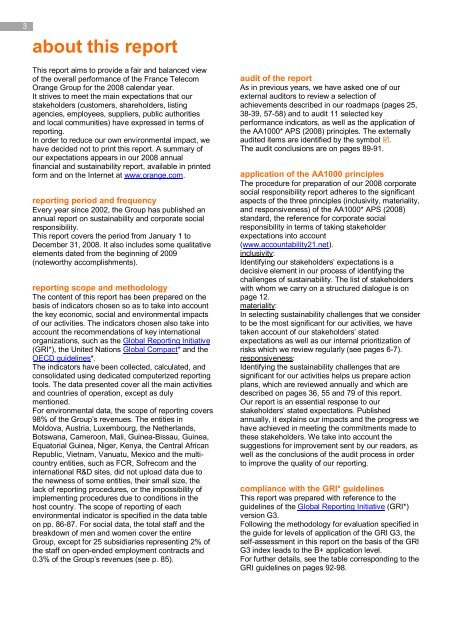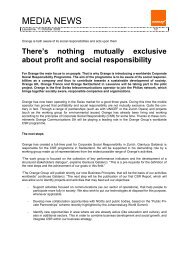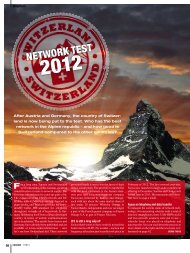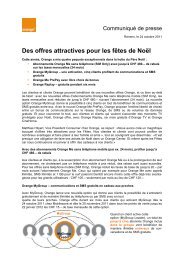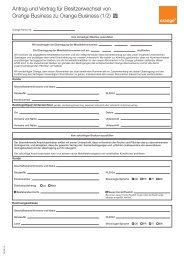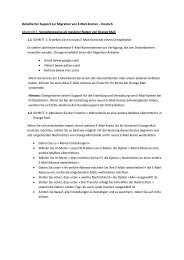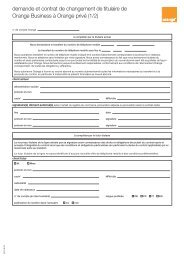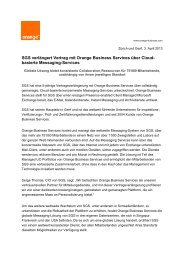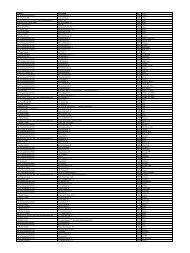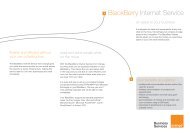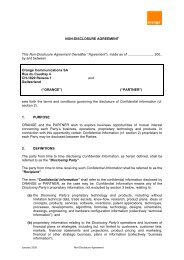corporate social responsibility complete report France ... - Orange
corporate social responsibility complete report France ... - Orange
corporate social responsibility complete report France ... - Orange
Create successful ePaper yourself
Turn your PDF publications into a flip-book with our unique Google optimized e-Paper software.
3about this <strong>report</strong>This <strong>report</strong> aims to provide a fair and balanced viewof the overall performance of the <strong>France</strong> Telecom<strong>Orange</strong> Group for the 2008 calendar year.It strives to meet the main expectations that ourstakeholders (customers, shareholders, listingagencies, employees, suppliers, public authoritiesand local communities) have expressed in terms of<strong>report</strong>ing.In order to reduce our own environmental impact, wehave decided not to print this <strong>report</strong>. A summary ofour expectations appears in our 2008 annualfinancial and sustainability <strong>report</strong>, available in printedform and on the Internet at www.orange.com.<strong>report</strong>ing period and frequencyEvery year since 2002, the Group has published anannual <strong>report</strong> on sustainability and <strong>corporate</strong> <strong>social</strong><strong>responsibility</strong>.This <strong>report</strong> covers the period from January 1 toDecember 31, 2008. It also includes some qualitativeelements dated from the beginning of 2009(noteworthy accomplishments).<strong>report</strong>ing scope and methodologyThe content of this <strong>report</strong> has been prepared on thebasis of indicators chosen so as to take into accountthe key economic, <strong>social</strong> and environmental impactsof our activities. The indicators chosen also take intoaccount the recommendations of key internationalorganizations, such as the Global Reporting Initiative(GRI*), the United Nations Global Compact* and theOECD guidelines*.The indicators have been collected, calculated, andconsolidated using dedicated computerized <strong>report</strong>ingtools. The data presented cover all the main activitiesand countries of operation, except as dulymentioned.For environmental data, the scope of <strong>report</strong>ing covers98% of the Group‟s revenues. The entities inMoldova, Austria, Luxembourg, the Netherlands,Botswana, Cameroon, Mali, Guinea-Bissau, Guinea,Equatorial Guinea, Niger, Kenya, the Central AfricanRepublic, Vietnam, Vanuatu, Mexico and the multicountryentities, such as FCR, Sofrecom and theinternational R&D sites, did not upload data due tothe newness of some entities, their small size, thelack of <strong>report</strong>ing procedures, or the impossibility ofimplementing procedures due to conditions in thehost country. The scope of <strong>report</strong>ing of eachenvironmental indicator is specified in the data tableon pp. 86-87. For <strong>social</strong> data, the total staff and thebreakdown of men and women cover the entireGroup, except for 25 subsidiaries representing 2% ofthe staff on open-ended employment contracts and0.3% of the Group‟s revenues (see p. 85).audit of the <strong>report</strong>As in previous years, we have asked one of ourexternal auditors to review a selection ofachievements described in our roadmaps (pages 25,38-39, 57-58) and to audit 11 selected keyperformance indicators, as well as the application ofthe AA1000* APS (2008) principles. The externallyaudited items are identified by the symbol .The audit conclusions are on pages 89-91.application of the AA1000 principlesThe procedure for preparation of our 2008 <strong>corporate</strong><strong>social</strong> <strong>responsibility</strong> <strong>report</strong> adheres to the significantaspects of the three principles (inclusivity, materiality,and responsiveness) of the AA1000* APS (2008)standard, the reference for <strong>corporate</strong> <strong>social</strong><strong>responsibility</strong> in terms of taking stakeholderexpectations into account(www.accountability21.net).inclusivity:Identifying our stakeholders‟ expectations is adecisive element in our process of identifying thechallenges of sustainability. The list of stakeholderswith whom we carry on a structured dialogue is onpage 12.materiality:In selecting sustainability challenges that we considerto be the most significant for our activities, we havetaken account of our stakeholders‟ statedexpectations as well as our internal prioritization ofrisks which we review regularly (see pages 6-7).responsiveness:Identifying the sustainability challenges that aresignificant for our activities helps us prepare actionplans, which are reviewed annually and which aredescribed on pages 36, 55 and 79 of this <strong>report</strong>.Our <strong>report</strong> is an essential response to ourstakeholders‟ stated expectations. Publishedannually, it explains our impacts and the progress wehave achieved in meeting the commitments made tothese stakeholders. We take into account thesuggestions for improvement sent by our readers, aswell as the conclusions of the audit process in orderto improve the quality of our <strong>report</strong>ing.compliance with the GRI* guidelinesThis <strong>report</strong> was prepared with reference to theguidelines of the Global Reporting Initiative (GRI*)version G3.Following the methodology for evaluation specified inthe guide for levels of application of the GRI G3, theself-assessment in this <strong>report</strong> on the basis of the GRIG3 index leads to the B+ application level.For further details, see the table corresponding to theGRI guidelines on pages 92-98.


